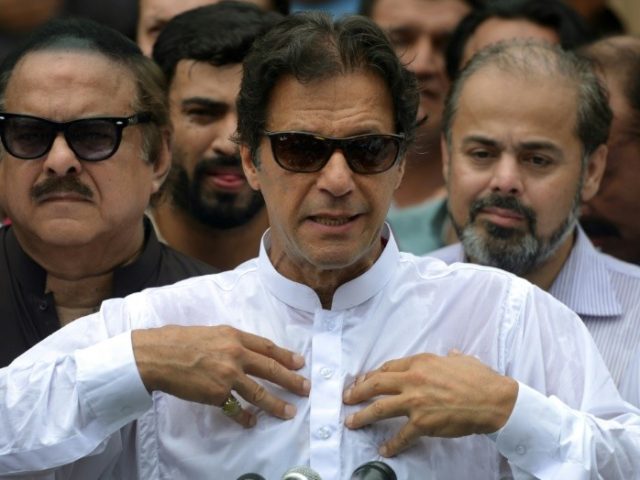Pakistan facilitated the negotiations this week between the United States and Taliban to end the more than 17-year-old war in Afghanistan, Prime Minister Imran Khan declared via Twitter on Tuesday.
Referring to Monday’s talks between U.S. President Donald Trump’s peace envoy, Zalmay Khalilzad, and the Taliban in the United Arab Emirates (UAE), PM Khan wrote, “Pakistan has helped in the dialogue between Taliban and the US in Abu Dhabi. Let us pray that this leads to peace and ends almost three decades of suffering of the brave Afghan people. Pakistan will be doing everything within its power to further the peace process.”
Pentagon officials have long accused Pakistan of willingly serving as a sanctuary for the Afghan Taliban and its Haqqani Network allies.
The Trump administration has suspended hundreds of millions in funding for Pakistan over Islamabad’s refusal to take decisive action against the two groups, known to orchestrate attacks against U.S. troops in Afghanistan from Pakistani soil.
Taliban spokesman Zabiullah Mujahid confirmed the U.S.-Taliban negotiations in the UAE, saying in a statement issued Tuesday, “Yesterday the delegation of Islamic Emirate held extensive rounds of meetings with the high-ranking officials of Saudi Arabia, Pakistan and [the] United Arab Emirates in Abu Dhabi.”
Saudi Arabia, Pakistan, and the UAE are the only countries that officially recognized the Taliban regime during its five years of oppressive rule in Afghanistan and are believed to have significant influence over the group.
Although the Wall Street Journal (WSJ) and other news outlets reported that Afghan government negotiators traveled to the UAE to join U.S.-brokered talks with the Taliban, the group’s spokesman denied any plans to meet any representatives from Kabul.
The terrorist group considers Kabul to be an illegitimate regime imposed by foreign powers and has refused to negotiate directly with the Afghan government.
Days after accusing Pakistan of “doing nothing” to combat terrorist groups like the Taliban, President Trump did send a letter to Khan last month requesting “assistance and facilitation in achieving a negotiated settlement of the Afghan war.”
“We will try our best. Putting pressure on the Taliban is easier said than done. Bear in mind that about 40 percent of Afghanistan is now out of the government’s hands,” Khan told the Washington Post (WaPo) when asked about the letter this month.
According to the U.S. Special Inspector General for Afghanistan Reconstruction (SIGAR), a watchdog agency, terrorist groups, mainly the Taliban, control or contest about 45 percent of Afghanistan.
An analysis by BBC revealed that the Taliban are active in 70 percent of the country.
Islamabad has welcomed U.S. President Donald Trump’s decision to make political reconciliation between the Afghan Taliban and Kabul the primary tenet of America’s strategy to end the war, raging since October 2001 at an estimated cost of nearly $1 trillion and a human toll of 2,272 U.S. military fatalities and 20,412 injuries, mostly at the hands of the Taliban.
The Trump administration has come out in full support of Ashraf President Ghani’s offer to the Taliban of a ceasefire and legitimacy as a political organization.
In other words, the Trump administration supports reinstalling the same Taliban jihadist group American forces overthrew in late 2001 as a legitimate political power.
Marking a significant departure from its predecessors long sought by the Taliban, the Trump administration is negotiating directly with the terrorist group as part of its intensified efforts to end the conflict.
U.S. special envoy Khalilzad, an Afghan national, is leading America’s efforts to end the war.
Alluding to the latest round of talks on Monday, WSJ reported:
There was no immediate indication from the participants about what is being discussed at the meeting. But a person in Abu Dhabi with close ties to the Taliban said Mr. Khalilzad had asked the group to declare a six-month cease-fire as a confidence-building measure. It wasn’t clear, the person said, what the American envoy offered in return. Still, the Afghan government’s decision to dispatch a negotiating team to Abu Dhabi is significant.
While Afghan officials are known to have regular contact with the Taliban, the negotiating team’s arrival in Abu Dhabi is believed to be the government’s first formal engagement with the insurgency as part of the latest U.S.-sponsored peace push, which began in July. Before this U.A.E. gathering, U.S. officials met separately with Taliban representatives at least twice in Qatar.
Taliban spokesman Mujahid said the recent talks focused on the withdrawal of foreign forces from Afghanistan, something the terrorist group has insisted on for years.
In August, retired U.S. Army Col. Chris Kolenda, a former U.S. ambassador, told the Daily Beast that the jihadi group might be willing to abandon their long-held demand that U.S.-NATO forces must completely pull out from Afghanistan.
Echoing the retired colonel, the Journal noted, “Taliban officials have shown in their talks with the U.S. since July some willingness to moderate the group’s absolutist demands, accepting, for example, an incremental withdrawal of American forces over an extended period of years, people familiar with the talks say.”

COMMENTS
Please let us know if you're having issues with commenting.